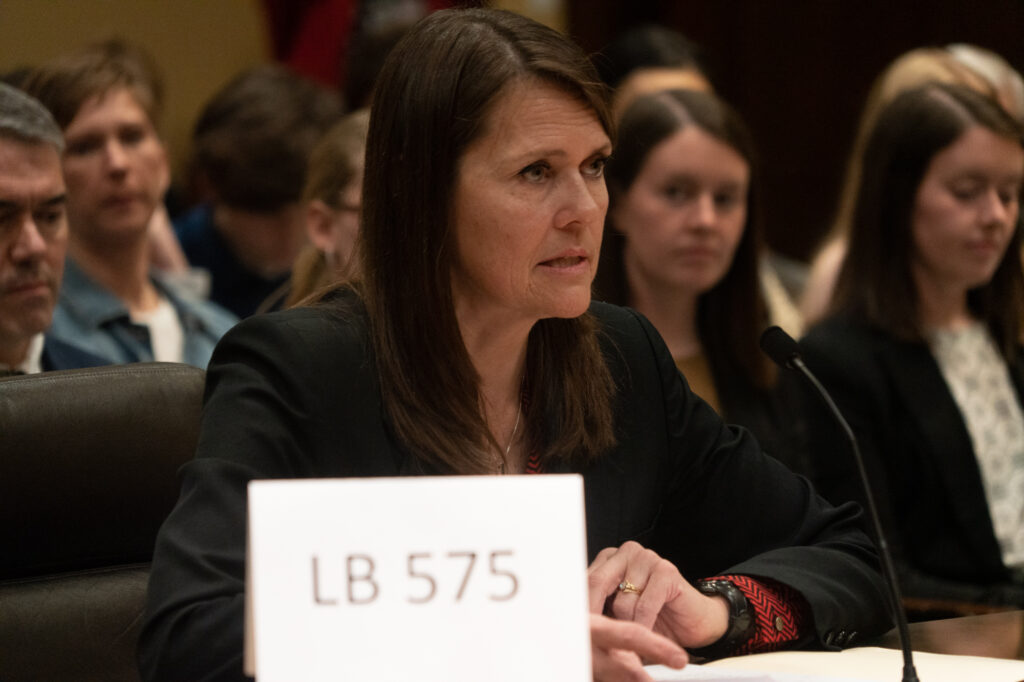
Photo / Zach Wendling, Nebraska Examiner
State Sen. Kathleen Kauth of Omaha introduces a bill Monday in Lincoln before the Education Committee that would define school bathrooms and sporting teams as either male or female.
—
Zach Wendling
Nebraska Examiner
LINCOLN — Tensions rose Monday as dozens testified on a bill that would define school bathrooms and sports teams as biologically male or female.
Legislative Bill 575, proposed by State Sen. Kathleen Kauth of Omaha would supersede a Gender Participation Policy adopted by the Nebraska School Activities Association for sponsored athletics. The NSAA is a nonprofit overseeing sports at many public and private schools.
The NSAA policy allows transgender student-athletes to participate in sports that match their gender identity and allows cross-gender participation if girls do not have the same or comparable sport. This is done through an application and approval process.
Transgender boys could play on boys’ teams without gender-affirming care, but transgender girls are required under the policy to undergo hormonal therapy or sexual reassignment surgery as well as physiological testing for a minimum of one year to determine that the athlete does not possess physical or physiological advantages over “genetic females” of the same age group.
Legislative Bill 574, also proposed by Kauth, would prohibit this care for minors in the state. In an interview, Kauth said the NSAA and other schools would likely need to adopt a new policy based on that bill’s outcome, too.
If Kauth’s bill passes, youths would be required to use bathrooms and play on sports teams that match their assigned sex as birth with chromosomes of XY for males and XX for females. Transgender youths could play sports, but only on teams matching their assigned sex at birth.
‘Common sense’ vs. ‘dehumanizing’
Kauth said her bill is a “fair” and “common sense” measure that would “uphold Title IX” and allow schools to determine a policy to track students’ sex for bathrooms and sports teams.
“Adolescence is a tumultuous time for young people,” Kauth told the Education Committee on Monday. “Natural changes that come with puberty can be awkward and embarrassing. Allowing biological males or females into each other’s private spaces will cause extreme discomfort and distress for many students.”
Eighteen states have passed laws restricting school sports teams on the basis of sex, with more being considered this year.
Murdoc Stokes, a 17-year-old from Central High School, who said he is transsexual and queer, urged the committee to kill the bill because it is “dehumanizing.”
“Hatred will always wither in the face of trans joy,” Stokes said. “I urge you to oppose Bill 575 and ones like it to allow kids like me to blossom because we are your children … and we aren’t going anywhere.”
Those testifying included 29 proponents and 47 opponents, with about another dozen who were unable to speak due to time constraints, some of whom audibly criticized the committee for the three-hour time constraint on each side.
‘Level playing field’
Dr. Greg Brown, who has a Ph.D. in the biological basis of health and human performance and is a professor of exercise science at the University of Nebraska at Kearney, testified that boys and girls have distinct anatomical and physiological differences.
Puberty acts as a “turbocharger,” he said, giving boys an advantage over girls. This could include muscle mass or height.
“LB 575 is necessary because it seeks to maintain the level playing field for female athletes without the intrusion of male bodies,” Brown said.
The NSAA policy lists competitive equity — specifically a “level playing field” — among four goals it seeks to balance, which include personal privacy, student physical safety and equal opportunity.
Three UNK students — Hannah Anderson, a senior studying exercise science; Paige Steinman, a junior studying exercise science; and Piper Steinman, a junior studying health science and nutrition — also testified in support. Anderson is on UNK’s track and field team, while the Steinmans are on the cross country team.
Paige Steinman said one reason men can outperform women is due to the “female athlete triad,” a term that encompasses low energy availability, menstrual dysfunction and low bone mineral density.
‘Mental health crisis’
Dr. Donna Faber, a family medicine doctor with Nebraska Medicine in Omaha, testified in opposition and gave the committee MRI scans where a transgender woman’s brain showed more similarities with women than men.
Faber and multiple medical professionals who testified in opposition pointed to statistics from leading LGBTQ-oriented groups such as GLSEN and the Trevor Project whose data shows LGBTQ youth are at a much higher risk of depression or anxiety, bullying and suicide.
These statistics are higher for transgender youths than for the LGBTQ community as a whole.
Dr. Rose Essecks, testifying in opposition for the Nebraska Psychological Association, said transgender youths are more likely to skip school or drop out.
“We are in the middle of a youth mental health crisis, and transgender children and teens are already at higher risks than cisgender youth at developing significant mental health problems as a result of the discrimination and victimization they experience on a daily basis,” Essecks said.
Acceptance and support, however, minimize these risks and outcomes, Essecks said.
Multiple opponents said that because the NSAA already has a policy, Kauth’s bill is unnecessary.
‘Stand up to protect’ girls
Dr. Linda Vermooten, who was a chair of psychology at Grace University in Omaha for multiple years before it closed, said Nebraska needs to stand up for girls no matter how many transgender Nebraskans Kauth’s bill may address, which testifiers said is at most 10 or fewer students.
“Yes, that’s at this moment,” Vermooten said of the number. “If we don’t have a law like this, who and when will we stand up to protect the rights of girls, a majority as opposed to the minority?”
Sherry Brink, a former Husker women’s basketball player, said Kauth’s bill would help women have the opportunity to “run free” and play sports in a safe environment while building community, teamwork, work ethic, sportsmanship, relationships and other qualities.
“We were joined together, we had limited distractions and we had our parents behind us,” Brink said. “I can’t imagine that atmosphere and community today.”
Carol Frost, whose time at the University of Nebraska preceded the 1972 Title IX law, said she coached Husker women’s cross country and track and field teams and saw for years how men would outcompete against women.
Frost said that many top rankings for women are all below those for men, which could lead to unfairness if a transgender woman were to join a women’s team.
‘Not looking to be’ Nebraska champion
Tiffany Weiss, a mother in Kearney who testified alongside her 13-year-old transgender son, Alexander, said the proposed bill puts her in an “impossible” situation of wanting to protect her son who just wants to play sports.
Alexander, whose mother said he is on hormone blockers and has been transitioning for four years, said he loves to play basketball and sports generally, which help him overall.
Should the bill pass, he’d be required to use the girls’ locker room, and both Alexander and his mother said that would not work because Alexander looks like and is a boy. Many peers do not know he is trans, Tiffany Weiss added.
Noemi Gilbert, a senior at Omaha Central High School, said Kauth’s bill would violate their religion as a transgender Reform Jew. Gilbert led a 5-second moment of silence for Brianna Ghey, a 16-year-old trans girl fatally stabbed in the United Kingdom, and “all trans youth who have lost their lives to social violence and exclusion that bills like this promote.”
Louis Rens, whose transgender daughter goes to school in Omaha, said all transgender kids want is to fit in, a task that is already tough.
“She’s not looking to be the Nebraska champion long-distance runner,” Rens said. “She just wants to be with her friends and participate.”








